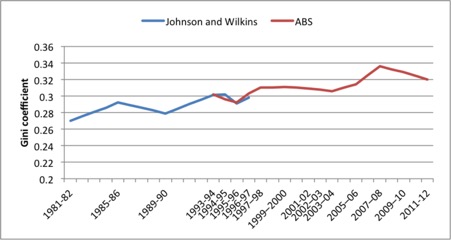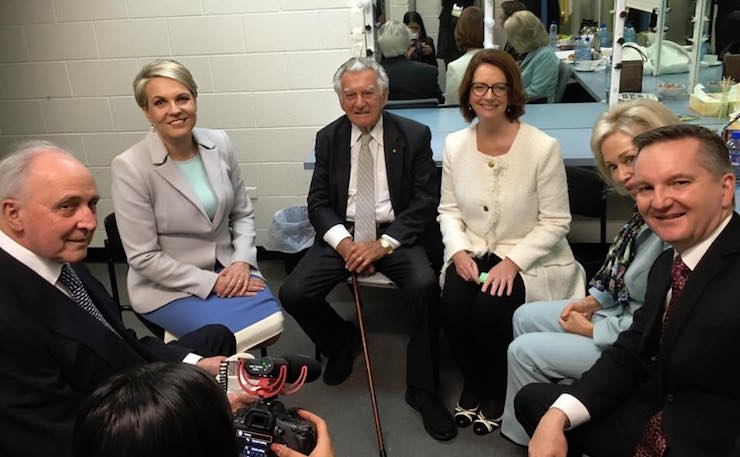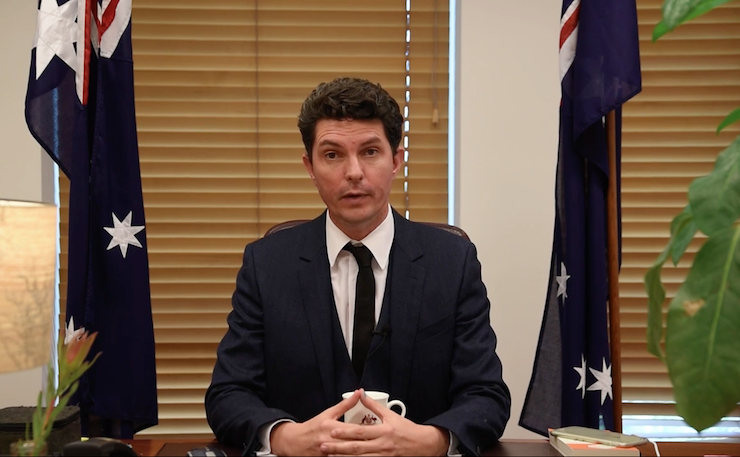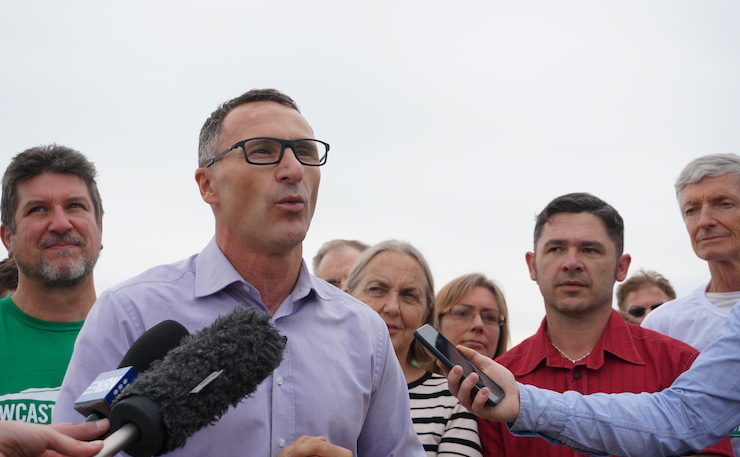New Matilda columnist Michael Brull, who has volunteered with the Greens during the current election campaign, makes the case.
Crikey columnist Helen Razer recently wrote two columns about why she won’t vote for the Greens. I think both articles are dreadful. I think she should, and so should any other leftist. Though her mind may be made up, I respond to her articles at length to set out why the Greens should properly be considered the best party for leftists to vote for.
Wince And Vote For The Party Of Neoliberalism?
Ultimately, for Razer, the most important issue to address is inequality, which is “really, really bad”. And unfortunately, though the Greens “speak urgently of change… they provide no real prescription for the big shift they say, and I agree, is needed.”
Let us suppose Razer is right. The Greens “choose not to disturb our social and economic organisation,” instead favouring empty “moralising about those who won’t publicly agree that inequality is really, really bad.” What does Razer think is the proper way to address inequality?
She votes for the ALP. But rest assured, she does so “while wincing”. Though Razer deplores empty moralism in just about everything she writes, including her polemics against the Greens, suddenly voting for the ALP is the way to go. What happened to how really, really bad inequality is?
Razer doesn’t really explain why the ALP is better suited to addressing inequality. Frankly, there are no good reasons for this, because it’s wrong. The best she can muster are dubious assertions about the ALP’s trajectory. Razer writes:
There are some older people in the party who have permitted the PJK economic dream to mutate into neoliberalism not too distinct from that of the Coalition. There are some younger people in the party who have permitted the PJK cultural dream into post-material compassion not too distinct from that of the Greens.
What does this mean? For those unaware, PJK is Paul Keating, the Treasurer under Bob Hawke in the ‘80s and then Prime Minister for the first half of the ‘90s. His vision didn’t “mutate” into neoliberalism. Keating brought neoliberalism to Australia. And he continues to brag about his economic reforms every chance he gets.

To rehash old and well-established ground, David Johnson and Roger Wilkins describe the increase in income inequality from the 1980s to 1990s as “reasonably well established”. They cite various other scholarly studies with the same finding of an increase in income inequality from the 1980s to the mid-1990s, such as Blacklow and Ray, Harding and Greenwell, and Pappas. Johnson and Wilkins found that “consistent with previous research… private income inequality grew substantially between 1982 and 1997-8”. They further found that the primary area of increasing income inequality has been the high growth of income of the wealthy over and above everyone else. Peter Whiteford’s recent review of income inequality in Australia cites similar studies with similar findings.
Or as radical journalist John Pilger wrote in 1995: “Keating deregulated and privatised to such an extent that he all but eliminated the base of an economy that had once produced the most equitable spend of personal income in the world… One per cent of the population now owned 20 per cent of the national wealth: double the figure when Labor won office from the conservative coalition.” Razer doesn’t bother to explain her nostalgia for Keating’s “economic dream”, but it’s hard to square with her professed concern for inequality. Or her professed Marxism.
HOUSE AD – NEW MATILDA NEEDS YOUR HELP. OUR LATEST FUNDRAISER ON POZIBLE IS HERE. HELP US PAY OUR HUGE LEGAL BILLS AND KEEP INDEPENDENT MEDIA ALIVE!
Chris Bowen, Hero Of The Revolution
Razer then explains why she has hope for the ALP: “what has begun to re-emerge, particularly in the policies of Chris Bowen, is the view that power is most effectively returned to citizens in the form of material. A decent life and fairer labour conditions produces a fairer and more decent citizen.” Compassion for the less fortunate, on the other hand, Razer treats with contempt.
So what is the radical vision of Chris Bowen? How is he going to return power to citizens and protect labour conditions?
This is Bowen setting out the ALP’s economic agenda in May:
I don’t pretend that achieving our priorities, defending the AAA rating at the same time as having proper investments in schools and funding of hospitals will be easy. It won’t But it is precisely because of the degree of difficulty that we have to be both detailed and bold when it comes to budgetary policies.
I don’t see Budget repair and defending the AAA credit rating as a competing objective with investment in schools, infrastructure and hospitals: I see them as complementary and essential parts of a real plan for economic growth.
So balancing the budget, defending Australia’s credit rating (by “dropping ideological leanings and reducing the deficit”), and investing in schools, infrastructure and hospitals. That’s it. That’s Bowen’s inspiring vision, returning power to citizens, and fairer labour conditions.

His speech was no anomaly. In November last year, he again stressed over and over the need to balance the budget and maintain the AAA rating. After all, “A commitment to social justice must and can partner with a fiscally rigorous, prudent approach.” Preparing the ground for ALP austerity, Bowen announced that “We understand that tough decisions are necessary to return the budget to surplus over time.” And he praised the “Hawke/Keating Government, the most successful reforming government in our history”.
We’ve already seen what their reforms brought to Australia. Yet Razer is still able to conclude that Bowen really gets the issue of inequality in a way that the Greens don’t.
Rather than looking at Bowen’s policies on inequality, let’s look at the ALP’s policies on “tackling inequality and disadvantage” (contra Razer, this empty rhetoric features far more prominently on the ALP website than the Greens). How will they tackle inequality? Well, by “Committing to Community Radio”. By “Giving Women’s Sport the Attention it Deserves”. And “Creative Industries, Creative Countries”. And “Republic Timeline”. If that was on the Greens website, Razer would be the first in line to ridicule that kind of silly and insubstantial bullshit. But these kinds of policies to tackle inequality and disadvantage apparently strike Razer as material and important, unlike the latte-sipping Greens.
But let us suppose that Bowen really does offer radical policies that would transform Australia, that the speeches cited above have been repudiated somehow, and that I have somehow missed it all. That would only matter for someone naïve enough to trust a proven liar like Chris Bowen.
Back in opposition in 2006, Bowen passionately opposed the offshore detention of asylum seekers. He said that “decency and self-respect as a nation” would mean onshore processing, and a process that was both “fair” and “swift”. Then the ALP won the election, he became Immigration Minister, and Bowen promptly changed his position to suit the party’s interests, proudly embracing the so-called “Malaysia Solution”. Before long, he was complaining that “we can’t process people offshore because Tony Abbott won’t pass our legislation”. Helen Razer: is that the man you really think offers hope for substantial change in Australia? Do you really believe in him?
Let me underline the point. Razer complains that it doesn’t matter that the Greens oppose inequality, because the Greens don’t offer policies that would meaningfully challenge it. Instead, Razer supports the ALP. Because of the unspecified words of its shadow treasurer, which are to the right of the Greens. The shadow treasurer, that is, who has a clearly documented record of saying one thing in opposition, and back-flipping when in power. And who has repeatedly stressed that his priority is balancing the budget – and possibly making “tough” cuts – while investing in hospitals and schools. And who is a big fan of the economic reforms in Australia that drastically increased inequality here.
One final point on this issue. Razer says that inequality is “inevitable if you don’t take a hammer to its foundation.” Let’s try to think of who has more credibility on the issue.
Back in 2014, in the wake of a scandal at the Commonwealth Bank, the Greens called for a royal commission into it. The ALP, led by Shorten, rejected this call. After a Senate inquiry into another scandal at the six big banks, the Senate invited their CEOs to come for questioning. Their invitation was withdrawn, allegedly due to pressure by Shorten and Bowen, allegedly responding to pressure from the big banks. The Greens again called for a royal commission into the big banks. Bowen once again rejected this call. No one in the ALP voted for the Greens’ motion, and Fairfax reported that “Opposition Leader Bill Shorten and shadow treasurer Chris Bowen were not keen to help launch an investigation into the entire financial services sector.”
In the era of Rudd and Gillard from 2009-2013, the ALP repeatedly rejected calls to investigate the banks. It was only in April that Shorten finally offered his support, after first embarrassing himself with a series of inept and ambiguous statements on the issue.
As I’ve said before: does anyone really think Bill Shorten’s ALP is willing to get into a serious fight with the big banks? They’re the ones you expect to “take a hammer” to capitalism?
In Grayndler, I’ve volunteered to help with Green’s candidate Jim Casey’s campaign. Anthony Albanese – from the left of the ALP – has urged voters to vote for him to save capitalism, complaining that Casey is a “hard Marxist”. Casey proudly identifies as a socialist. Albanese has the backing of the Daily Telegraph, a preference deal with the Liberals, and Ray Hadley. Are we really meant to think that the ALP poses any meaningful threat to the status quo, when the conservative establishment is clearly so comfortable with its candidates? If the Greens are so conservative, why is there such hysteria about them from the right?
 The Greens On Inequality
The Greens On Inequality
Razer makes no effort to seriously discuss substantive policies. Yet this is the most important issue in evaluating the merits of voting for a party. Of course, economic policies are particularly boring, so I will try to be brief. Though Razer claims that the Greens engage in empty posturing on inequality, the issue features less prominently on their policy platform. They do propose various policies to address inequality, across various issues. I will briefly sample some of them below.
Perhaps mostly radically, in social services, they favour a universal guaranteed adequate income. This would be a tremendous achievement. Is it on the cards? No. But then, this shows the limit of Greens radicalism. As long as they depend on either the ALP or Coalition to push through legislation, they will be bound to find pragmatic types of reform that can appeal to the major parties and the public more generally. That is, unless and until more leftists abandon their nostalgia for the ALP of 45 years ago and vote for the Greens.
The Greens favour meaningful reforms that would improve the lives of many people. Take industrial relations. The Greens want a system with the following features:
maintaining a legislated minimum standard for pay, annual leave and hours of work that protects all employees and workers;
providing comprehensive industry-wide awards that give rights and entitlements in excess of the legislative minima and which are determined by conciliation and arbitration before an effective and independent industrial tribunal;
facilitating collective agreements that are union negotiated and exceed the Award standards;
ensuring no workers are subject to laws and regulations detrimental to their interests on the basis of the industry in which they work;
ensuring individual arrangements cannot be sub-standard compared with awards or collective agreements; and
conforming with international law, especially ILO conventions no. 87 on freedom of association and the right to organise (1948) and no. 98 on the right to organise and collective bargaining (1949).
I doubt Razer would oppose a single one of these policies.

And so on through each portfolio. In housing policy, Greens support provision of supportive housing for the homeless, housing cooperatives, and adequate investment in public and community housing. They support law reform to make it more accessible, such as by supporting proper funding of community legal centres and legal aid.
In economics, the Greens favour progressive taxation as a response to inequality. The Greens advocate reforming trusts to minimise tax avoidance, “removing subsidies for the extraction and consumption of fossil fuels”, reforming superannuation “to benefit lower income earners”, and “strengthening the progressivity of the income tax and transfer system across all income levels including by reducing effective marginal tax rates for low income workers, and increasing the marginal tax rates on high income earners”.
They also propose tax reform to improve housing affordability and stop rewarding speculation, and backing the ACCC with more power and resources to prevent the formation of monopolies, and to “divest monopolies and oligopolies of assets if they are abusing their market power”. They also propose to “reduce executive salaries”. All of these are progressive measures that would challenge inequality, and the interests of the super-rich and big business.
Many of these policies aren’t radical. Progressive taxation, removing subsidies to big coal, abolishing negative gearing, funding CLCs, supporting public housing, and backing workers’ rights and fair conditions. The Guardian usefully provided a review of 10 policy areas of the three major parties. The Greens are to the left of the ALP on all of them.
More Than ‘Moralism’
In her first article, Razer said that Vote Compass puts her as a Greens voter every time. But she will never vote for the Greens. Why? It’s not entirely clear what kind of policies Razer thinks matter, but she doesn’t like economic inequality, wants a treaty with Aboriginal and Torres Strait Islander peoples, opposes metadata retention, and offshore detention of asylum seekers. On every single one of these issues, the Greens offer better policies.
So why not vote for the Greens? Well, much of Razer’s reasoning seems to amount to special pleading and guilty rationalisations. She observes a poll that found that 20 per cent of Greens voters don’t think they belong to any social classes. What does this prove? Nothing. But Razer upgrades this minority into something “so prevalent” among the Greens, upgrading them into an apt representation of the terrible Greens voters, their rhetoric which she doesn’t like (or cite), and why she couldn’t possibly vote for them.
Though Razer is always complaining about empty moralism, this seems to amount to empty moralising. However much Razer may not like one in five Greens voters, they still support Greens policies, and pose no obstacle to them being advocated for or implemented.
As policies are the most important issue, let’s review a few of them. No new coal-fired power stations or coal mines, no expansions to existing ones, net zero or negative emissions within a generation, 90 per cent clean energy by 2030, ending $21 billion in fossil fuel subsidies and the “influence of fossil fuel donations”.
The Greens support a treaty or treaties, which recognise “the prior occupation and sovereignty of Aboriginal and Torres Strait Islander peoples.” They support self-determination for Aboriginal and Torres Strait Islander peoples. They have a long record of opposing the Northern Territory Intervention, including running Barbara Shaw as a candidate in the NT. They support the repeal of the Stronger Futures legislation. For those who don’t know, that’s where the ALP enshrined the Intervention for 10 more years. Recall that Razer is voting for the ALP, not the Greens, because she doesn’t think the Greens “meaningfully” address racism.
They want to implement the recommendations of various reports, including Bringing them Home (on the Stolen Generations), the Royal Commission into Aboriginal Deaths in Custody, and the Little Children are Sacred report. They want to end compulsory income management and “any other measures which directly and indirectly discriminate against Aboriginal and Torres Strait Islander peoples”. They support “Fair compensation” for stolen wages. They support “Culturally appropriate, community controlled, and adequately resourced health, housing, infrastructure and legal services for Aboriginal and Torres Strait Islander peoples.” And they oppose closing remote Aboriginal communities.
The Greens support Medicare remaining universal, publicly funded by progressive tax. On asylum seekers, the Greens support “The elimination of mandatory and indefinite detention and the abolition of offshore processing… and other forms of punitive or discriminatory treatment of asylum seekers and refugees.” Asylum seekers shouldn’t be held beyond 30 days of health, security and identity checks. They support a proper National Broadband Network with fibre to the premises infrastructure.
The Greens advocate a national bill of rights (constitutionally protected), and actively participating in and engaging with UN human rights bodies. They support equal pay for women, and making abortion “Legal. Accessible. Affordable”. On domestic violence, they support $100 million in crisis accommodation, an increase in legal assistance of $200 million, and perpetrator interventions. They support decriminalising sex work, a comprehensive paid parental leave scheme, and “Community-based, affordable, accessible, quality childcare and incentives for onsite childcare facilities in workplaces.”
They support a free and democratic process of self-determination for West Papua, and opening it up to human rights monitors. They support a “comprehensive arms embargo” on Israel, an end to the occupation of the Palestinian territories occupied in 1967, and ending the siege on Gaza. The Greens were also a rare voice of dissent during our rush to war on Syria.
All of this amounts to a considerable body of progressive policy proposals, which would drastically change Australia in many ways if implemented. Though the Greens may not be communists, their proposals are considerably more radical than those of Bernie Sanders which so enthused so many young people across Australia and America.
So why not vote 1 for the Greens? When I interviewed Jim Casey, I asked why people should vote for him. He said that the real reason was the Greens’ policies. There would be no surprises, and he would proudly advocate for Green’s policy positions on any question.
Really, that is exactly right. With the Greens, what you see is left-wing policies, and if you elect them, you’ll get left-wing policies. If you’re left-wing, you should vote for them. To paraphrase Hillel, the rest is commentary.
Donate To New Matilda
New Matilda is a small, independent media outlet. We survive through reader contributions, and never losing a lawsuit. If you got something from this article, giving something back helps us to continue speaking truth to power. Every little bit counts.





